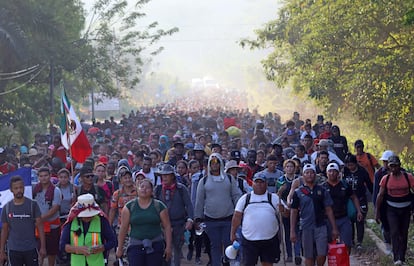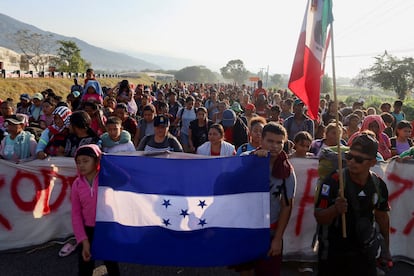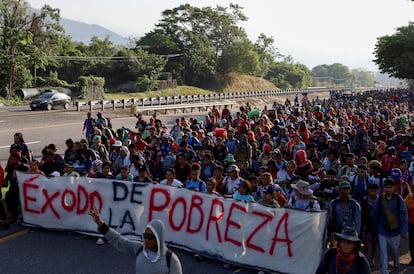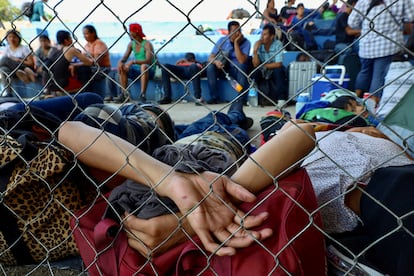‘Unprecedented’ migratory wave puts US-Mexico relations to the test
A top-level delegation, led by Antony Blinken, will meet with the Mexican president on Wednesday to discuss ‘enforcement actions’ to stem the flow of arrivals


Among the heartbreaking global humanitarian conflicts seen in 2023, it is important not to forget the Latin American migrants who cross through Mexico to the United States in search of a better future. Fleeing poverty and political repression, this dramatic exodus has seen an “unprecedented” spike in the past two months, according to the United States.
Proof of this are Washington’s continuous diplomatic contacts with Mexico, which are testing the bilateral relationship. On Wednesday, in the middle of the Christmas break, a top-level U.S. delegation will visit Mexican President Andrés Manuel López Obrador to again address the migration crisis in a face-to-face meeting. The new delegation will be led by U.S. Secretaries of State Antony Blinken, and include Secretary of Homeland Security Alejandro Mayorkas and Homeland Security Advisor Elizabeth Sherwood-Randall.
The number of migrants detained at U.S. border crossing has increased by 31%, reaching 69,462 detentions, according to data from the U.S. Customs and Border Patrol. On Christmas Eve, a caravan of thousands of people left Chiapas, in the south of Mexico, and is now advancing to the U.S. border. In the middle of winter, entire families will try to cross Mexico. In addition to the poor conditions, the migrants also face the risk of corruption and extortion schemes.
Last week, in view of the spike in arrivals, the United States closed several ports of entry, seriously affecting the imports and exports of both the U.S. and Mexico. This sparked emergency calls that succeeded in reopening the international crossing bridges. The Mexican business association accused the closures of causing million-dollar losses.
In a call last Thursday, U.S. President Joe Biden and López Obrador agreed to meet on Wednesday to negotiate “additional enforcement actions” to regulate the migratory influx and ensure the trade flow between the countries. The latest of the anti-immigration measures, passed in Texas by Republican Governor Greg Abbott, allows state authorities to detain and deport undocumented people to Mexico — which before now, only federal authorities were allowed to do. The rule — scheduled to come into force in March — has been described as the toughest law against migrants to date in the United States and earned the condemnation of the Mexican president.





Migration is a tail-eating serpent. Countries affected by U.S. economic sanctions, such as Cuba or Venezuela, argue that these restrictions are what are pushing people to migrate. In an October 22 meeting, held at the request of Mexico, various Latin American leaders attempted to address the crisis by focusing on the situation in the countries of origin.
The Mexican government — which is reluctant to crack down on Latin American migrants passing through the country— is caught between two fires. On the one hand, it is under pressure from the U.S. to stem migration. On the other, it is facing a massive outflow of Mexican nationals who have joined the caravans in order to cross illegally to the north. López Obrador’s government estimates that of the 307,000 people expected to be detained at the border by the end of the year, almost 75,000 will be Mexicans.
The political and economic crises shaking all of Latin America — particularly in Honduras, Venezuela, Guatemala and Nicaragua — are the origin of a migratory wave that condemns hundreds of thousands of people to extraordinary suffering as they leave their countries for the prosperous north. But meetings between political leaders are not resolving this issue, nor do they even come close to changing the state of affairs.
Condemned to understand each other, Mexico and the U.S. have maintained cordial relations throughout the past six years. One of Blinken’s recent visits to Mexico was preceded by the announcement that the U.S. was extending the border wall, but not even that soured relations.
The immigration crisis, however, is not the only thorny issue testing relations, Mexico and the U.S. are also facing the problem of fentanyl trafficking. This deadly drug enters from Mexico and kills more than 100,000 Americans a year. Another issue is the drug trafficking cartels, which play a role in the economy, drugs and migration.
During a recent visit to Mexico, the U.S. Secretary of the Treasury, Janet Yellen, tried to bring order to the matter by imposing economic sanctions on individuals and companies linked to drug cartels. At the beginning of December, Yellen also signed a memorandum of intent to focus a national security lens on foreign direct investment.
Today, the migration crisis is once again the top concern for both sides of the border. Far from being solved — no matter how many stopgap measures are introduced — thousands of people continue to suffer as they refuse to give up on their hope of finding a better future in the north.
Sign up for our weekly newsletter to get more English-language news coverage from EL PAÍS USA Edition
Tu suscripción se está usando en otro dispositivo
¿Quieres añadir otro usuario a tu suscripción?
Si continúas leyendo en este dispositivo, no se podrá leer en el otro.
FlechaTu suscripción se está usando en otro dispositivo y solo puedes acceder a EL PAÍS desde un dispositivo a la vez.
Si quieres compartir tu cuenta, cambia tu suscripción a la modalidad Premium, así podrás añadir otro usuario. Cada uno accederá con su propia cuenta de email, lo que os permitirá personalizar vuestra experiencia en EL PAÍS.
¿Tienes una suscripción de empresa? Accede aquí para contratar más cuentas.
En el caso de no saber quién está usando tu cuenta, te recomendamos cambiar tu contraseña aquí.
Si decides continuar compartiendo tu cuenta, este mensaje se mostrará en tu dispositivo y en el de la otra persona que está usando tu cuenta de forma indefinida, afectando a tu experiencia de lectura. Puedes consultar aquí los términos y condiciones de la suscripción digital.








































